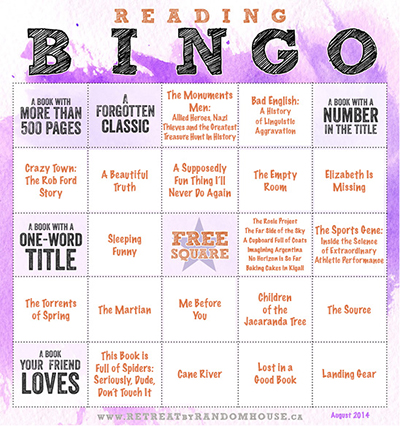Another Reading Bingo month right down to the wire. And only one book to boot. Well, it was 900 pages, so that’s really like three books.
A book at the bottom of your to-be-read pile:
The Source, by James A. Michener
(Paperback, 909 pages, published July 9, 2002 by Dial Press Trade Paperback (first published 1965))
3 stars
Was I supposed to take this category literally? Sometimes the book at the bottom of my pile hasn’t been there very long – the pile does get shuffled up sometimes so that the book at the bottom could be one I bought last week. I figured the creators of Reading Bingo meant a book I’ve had hanging around for a long time. So I went looking for the book that I’ve owned the longest, and intended to read at the time I bought it, and then never did get around to reading. Voila… The Source. (I’ve had it for so long, it actually pre-dates my physical to-read pile, so it hasn’t even been included in the count this whole time!) I bought it 2006, on the recommendation of our travel agent when we booked a trip to Israel, because, well, it’s a novel about the history of Israel. But then we cancelled our trip a few days before our flight when a war broke out. And so, The Source has sat on my shelf ever since.
I thought the structure of the book was ingenious. It starts out on an archaeological dig at a fictional site in Israel in 1964. There, archaeologists mine through 15 levels, unearthing at each one an artifact relating to a different period in the history of the area. The book becomes a series of stories; one for each artifact and its time period, with a short jump back to 1964 where Michener takes a look at the theme of the current tale from a modern perspective. In such a way he gives us a peek at the history of the Holy Land, and the development of religion from the time of the dawn of agriculture around 9800 B.C.E. to the founding of the State of Israel in 1948. The main focus is on the history of Judaism and the Jewish people, but includes Christianity and Islam too, as well as some religions that preceded all of them. Ever wonder what those rabbis were thinking when they codified all those particular and peculiar laws into the Talmud? Or what drove one society after another after another after another to act so hatefully toward all the others around them? Or, (and this is the one that has always fascinated me) what could possibly have been going through the mind of the very first person who ever imagined any sort of deity? Well, here you have one man’s imaginings (thoroughly researched imaginings, no doubt) on all those things.
The book was at turns heart-wrenching, enlightening, compelling… and a touch boring. (It’s pretty detailed, and it took me so long to read that I would forget who was who and what happened just a couple of stories earlier. I also haven’t read any history on that part of the world or the Old Testament itself in a loooooong time, so I couldn’t remember the backgrounds in which the stories were set. (Who was that King David guy again???) But Michener gives some context with each vignette, so I got enough of the picture.) One of the things that amazed me is Michener’s ability to write different characters – Americans and Israelis; Arabs, Jews and Christians; ancient and modern – and get in each of their heads in a believable way to produce some thought-provoking dialogue. The Source highlights the vast complexities of religion: full of beauty and wisdom in some ways, but also completely freakin’ arbitrary. And the violence… oh my, the violence. If even one smidgeon of this book is true, then every day that goes by without someone trying to kill, torture, enslave, burn, displace, rape, humiliate, sacrifice or forcibly convert you in the name of his or her god or religion – or in opposition to yours – is to be cherished, because those days must be precious few. I think the book, like religion, will mean different things to different readers. It might renew someone’s love for his or her traditions, or shed some light on why some people find certain customs so appealing. On the other hand, it may reinforce someone else’s antitheism. At the very least, it’d be hard not to turn the last page without having given your spirituality or views on Israel a little thought along the way.
Until next month, loyal readers. To-read-pile count: 10. (So close to single digits!)


Mama mia! Holy Cow! My stars! My goodness! Man-oh-man!
My heavens! By Jove! Those don’t even scratch the surface. Takes a lot of courage to open up a 900 page book. Now I’m mad- I wished you had said it was awful and sooo boring, but it sounds like it was enlightening. I wonder if I can bring myself to read it. Hmmm since you are adverse to doing book reports, how bout a book talk? Thanks for the blog- you always make me wasn’t to read the book.